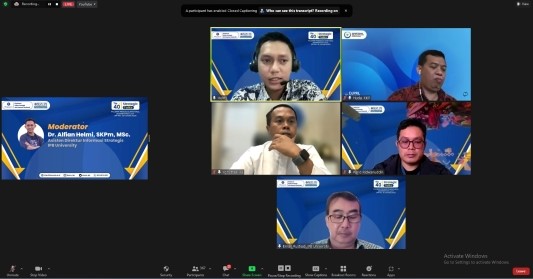Sea Sand Export Permit is a Polemic, IPB University Holds Strategic Talks Study

The issuance of Government Regulation (PP) Number 26 of 2023 concerning the Management of Sedimentation Results in the Sea has raised controversy. The main issue is the article that allows the export of sea sand abroad. In response to this, the Directorate of Strategic Studies and Academic Reputation (DKSRA) of IPB University organised The 40th IPB Strategic Talks: Polemics over the Management of Marine Sedimentation Results (PP No 26 of 2023), recently.
"IPB University has great attention in the field of agromaritime so that it feels called to open a discussion regarding the reopening of sea sand exports through PP No. 26 of 2023," said Prof Ernan Rustiadi as Vice Rector of IPB University in the field of Agromaritime Research, Innovation and Development in the introduction to the discussion.
He hopes that this discussion activity can become an academic pulpit and debate space, that everyone has the same right to convey their arguments as long as they are still in the scientific corridor.
Parid Ridwanuddin, Manager of the Coastal and Marine Campaign, Indonesian Forum for the Environment (WALHI) National Executive stated that PP No. 26 of 2023 has no urgency at all to be issued, let alone opening the sea sand export tap. According to him, if the regulation was made to overcome the sedimentation problem, it should be an upstream-downstream handling, because the cause of sedimentation is upstream.
"The accumulation of sedimentation in the sea that occurs is mostly caused by activities carried out on land. This PP only focuses on the phenomenon of sedimentation buildup in the downstream (sea) while activities on land that cause sedimentation are not considered," he said.
Parid also expressed concern over the legitimisation of sand mining from this policy. If sand mining is actually carried out, then in the future it will cause environmental damage that harms the wider community. "One of the biggest concerns of sand mining is the fate of small islands in Indonesia that are threatened with sinking," he added.
Meanwhile, Miftahul Huda, Director of Marine Services, Ministry of Maritime Affairs and Fisheries (KKP) explained that the background of PP No. 26 of 2023 was the phenomenon of coral reef destruction. The results of marine sedimentation, such as sand and mud, cause the closure of coral reefs which leads to the destruction of the coral reefs. This will lead to a decrease in the carrying capacity and capacity of coastal ecosystems and marine health. PP No. 26 of 2023 was then made as a regulation to anticipate more severe damage to coral reefs and as an effort to improve Indonesia's carrying capacity and marine health.
"The results of marine sedimentation mining are also not only for export and domestic reclamation needs, but also for government infrastructure development and infrastructure development by business actors as stated in Government Regulation Number 26 of 2023 Article 9 paragraph (2)," said Huda.
Huda added that sand and mud as a result of marine sedimentation need to be managed to be more useful. The benefits of managing marine sedimentation include restoring the quality of fish spawning grounds, supporting the quality of conservation areas, and mitigating risks to the environment around buildings and marine infrastructure.
Meanwhile, Dr Yonvitner, Head of the Center for Coastal and Marine Resources Studies (PKSPL) IPB University, argued that the birth of this PP is still very premature, so in-depth studies are needed before it is implemented in the field.
"The argument that has been presented regarding the handling of marine sedimentation will nourish the ecosystem, in fact, if viewed from the concept of ecosystem management, it is the role of the ecosystem that then makes sedimentation such as mangrove roots and seagrass,".
He also explained that the use of suction boats as a means of cleaning up marine sedimentation is also contradictory. He warned of potential risks if PP 26/2023 is implemented such as economic risks, ecological risks, biophysical, social, infrastructure and policy risks.
"Do not want to get 1 rupiah from the results of sea sedimentation, but we actually spend 5 rupiah for the cost of restoring the ecosystem and the environment, as the PKSPL IPB University study in 2003 related to sea sand mining," he said.
"The implementation of PP 26/2023 should be postponed. But if it is urgent and needed for our performance targets, then we must move quickly. The position of the PP in national policy must be straightened out and technical studies for academic papers and public feasibility tests must be carried out," Dr Yonvitner continued to make recommendations.
Dr Alfian Helmi, Assistant Director for Strategic Studies, DKSRA IPB University at this discussion stressed that it is necessary to further detail the supervision mechanism and study the impact of mining on marine sedimentation, the principle of prudence and sustainability must be a top priority in implementing this policy. (NZR-DKSRA/Rz) (IAAS/RUM)



